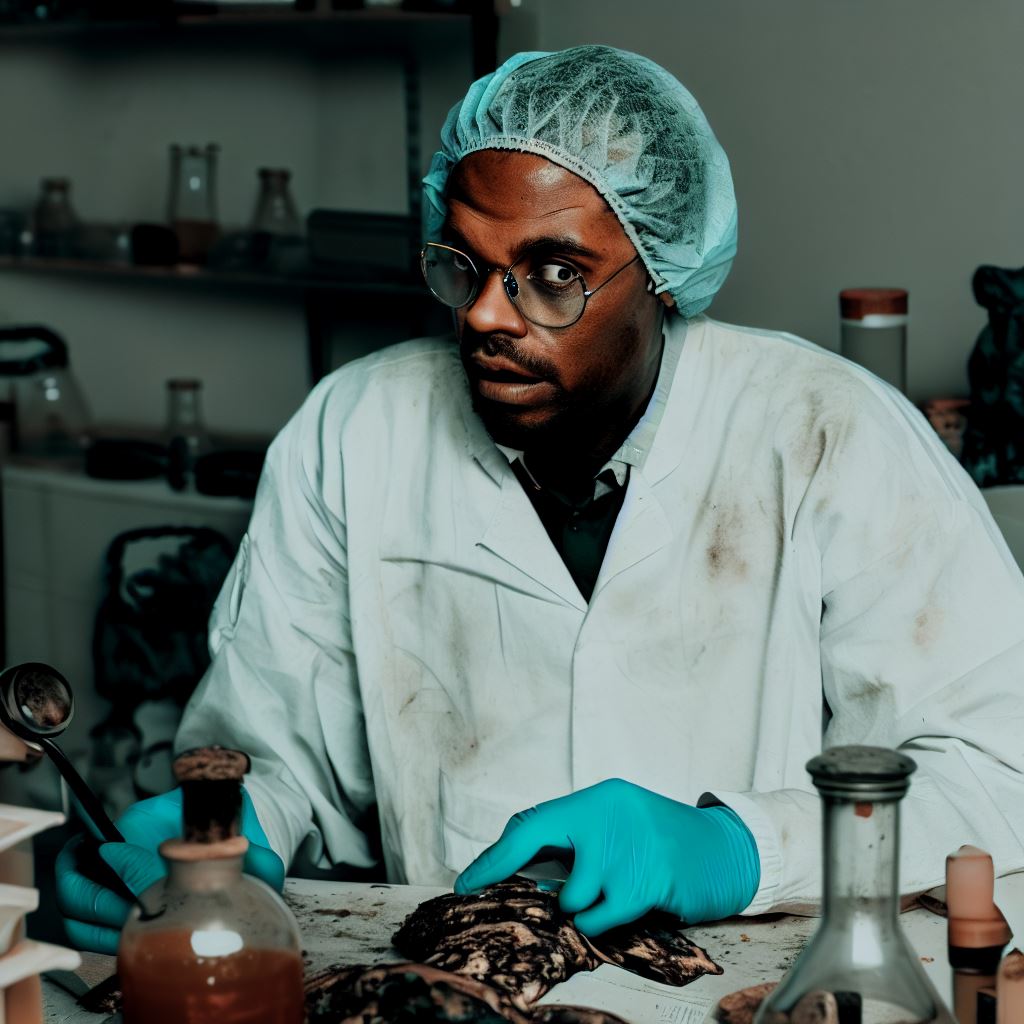Introduction
Forensic pathologists play a crucial role in Nigeria’s criminal justice system, investigating death and its causes.
They analyze medical evidence, perform autopsies, and offer expert testimony in court.
Key skills required for aspiring forensic pathologists include attention to detail, strong analytical skills, good communication skills, and the ability to handle stressful situations.
These skills are vital for accurately determining cause and manner of death, as well as presenting their findings effectively in court.
Forensic pathologists also need to have knowledge of anatomical sciences, pathology, forensic science, and criminal law.
In addition, they must possess excellent problem-solving abilities and be able to work well within a multidisciplinary team.
The attention to detail is crucial in examining microscopic tissues and specimens during autopsies, as well as carefully documenting their findings.
Analytical skills are necessary to interpret complex medical data and evidence accurately. Clear and effective communication skills are essential for presenting their findings to investigators, lawyers, and judges.
Lastly, the ability to handle stress is vital as forensic pathologists often encounter disturbing scenes and work on high-profile cases.
Aspiring forensic pathologists in Nigeria must possess key skills such as attention to detail, analytical thinking, good communication, and the ability to work under pressure to excel in this important field.
Solid Educational Background
Obtaining a medical degree is crucial for becoming a forensic pathologist in Nigeria. A solid educational background in medicine is the foundation for this career.
Specialization in forensic pathology is essential to develop the necessary skills and knowledge required for this field. It requires additional training and education beyond a general medical degree.
In Nigeria, there are specific educational paths to follow to become a forensic pathologist.
These paths include completing medical school, obtaining a license to practice medicine, and pursuing a residency program in forensic pathology.
Medical Degree
Having a medical degree is of utmost significance for individuals aspiring to be forensic pathologists in Nigeria. It provides a strong foundation in medical science and prepares students for further specialization.
A medical degree equips forensic pathologists with a comprehensive understanding of human anatomy, physiology, pathology, and medical investigation techniques.
During medical school, students learn how to diagnose diseases, conduct autopsies, and interpret medical data, which are essential skills required for forensic pathologists.
Specialization in Forensic Pathology
Beyond obtaining a medical degree, specialization in forensic pathology is necessary to become a certified forensic pathologist in Nigeria.
This specialization allows individuals to develop expertise in investigating the causes of death, analyzing forensic evidence, and providing expert testimony in legal proceedings.
To specialize in forensic pathology, individuals need to complete a residency program in forensic pathology after medical school.
During the residency program, aspiring forensic pathologists gain hands-on experience in performing autopsies, analyzing crime scene evidence, and documenting their findings.
Educational Paths in Nigeria
In Nigeria, there are specific educational paths one must follow to become a forensic pathologist.
- Complete a Bachelor of Medicine, Bachelor of Surgery (MBBS) degree from an accredited medical school.
- Pass the Medical and Dental Council of Nigeria (MDCN) licensing examination to obtain a license to practice medicine.
- Pursue a residency program in forensic pathology, which typically lasts for a period of four to five years.
- During the residency program, individuals receive comprehensive training in forensic pathology through rotations in various forensic departments.
- Upon completion of the residency program, individuals can apply for certification from the National Postgraduate Medical College of Nigeria (NPMCN) in forensic pathology.
Strong Analytical and Critical Thinking Skills
When it comes to being a forensic pathologist in Nigeria, possessing strong analytical and critical thinking skills is of utmost importance.
Analyzing and interpreting complex medical data is a crucial aspect of this profession.
Through careful examination of medical records, autopsy reports, and laboratory findings, forensic pathologists are able to piece together the puzzle of a person’s cause of death.
This requires them to thoroughly examine all available information, identify patterns, and draw logical conclusions.
The importance of analyzing and interpreting complex medical data
In the field of forensic pathology in Nigeria, the ability to analyze and interpret complex medical data is not just important; it is absolutely crucial.
Forensic pathologists are the unsung heroes of our justice system, providing critical insights into the cause of death in criminal cases and accidents.
To excel in this profession, a forensic pathologist must possess a unique set of key skills.
First and foremost, they must have a deep understanding of human anatomy and physiology, enabling them to identify injuries and diseases accurately.
They also need sharp analytical skills to dissect complex data from autopsies, toxicology reports, and crime scenes
The role of critical thinking in solving forensic mysteries
In the realm of forensic pathology in Nigeria, the importance of critical thinking cannot be overstated.
Forensic pathologists in the country are tasked with solving complex mysteries surrounding crime scenes, unexplained deaths, and various forms of violence.
To excel in this field, they must possess a set of key skills that rely heavily on active critical thinking.
First and foremost, forensic pathologists must have a keen eye for detail.
They meticulously examine evidence, such as autopsies, toxicology reports, and crime scene photographs, actively seeking inconsistencies and anomalies that could provide vital clues.
Additionally, effective communication skills are paramount. Forensic pathologists must actively convey their findings to law enforcement agencies and legal professionals.
The necessity of attention to detail in forensic pathology
Forensic pathology in Nigeria demands an unwavering commitment to attention to detail.
The ability to meticulously examine and analyze evidence is paramount in solving crimes and providing justice.
- Keen Observation: Forensic pathologists must possess a sharp eye to spot even the smallest clues during autopsies and crime scene investigations.
Every detail matters, from the position of a wound to the color of a bruise. - Analytical Thinking: A logical and methodical approach is essential.
Forensic pathologists must piece together evidence, connecting the dots to establish the cause and manner of death accurately. - Precision and Accuracy: Errors are unacceptable. Forensic reports must stand up in court, making precision in data collection and analysis vital.
- Attention to Protocols: Strict adherence to established protocols ensures that evidence is handled correctly, preventing contamination or mishandling.
- Patience and Perseverance: Complex cases may require hours or days of investigation. Forensic pathologists must be patient, not missing even the tiniest detail.
In the world of forensic pathology, lives and justice hang in the balance. The necessity of attention to detail cannot be overstated; it is the cornerstone of this crucial field in Nigeria.
Read: Continued Education for Geologists in Nigeria: A Guide
Excellent Communication and Interpersonal Skills
In order to be a successful forensic pathologist in Nigeria, it is crucial to possess excellent communication and interpersonal skills.
These skills are essential for effective interaction and collaboration with various stakeholders including law enforcement agencies, legal professionals, and families.
Need for effective communication with law enforcement agencies, legal professionals, and families
Forensic pathologists often work closely with law enforcement agencies and legal professionals in order to provide accurate and reliable medical opinions and testimonies.
Effective communication with these professionals is vital to ensure that all relevant information is adequately conveyed and understood.
Collaborating with law enforcement agencies requires clear and concise communication to discuss and analyze forensic evidence, such as autopsy results, cause of death, or any other relevant medical findings.
This collaboration helps to strengthen the credibility of forensic investigations.
Similarly, effective communication with legal professionals, such as lawyers and judges, is important during court proceedings.
Forensic pathologists need to clearly explain complex medical terms and concepts to facilitate understanding by the legal professionals, enabling them to present the evidence accurately in court.
Furthermore, communicating effectively with grieving families is crucial for a forensic pathologist.
These families often seek answers regarding the circumstances surrounding the death of their loved ones.
Compassion, empathy, and the ability to convey complex medical information in a comprehendible manner are vital in these situations.
Importance of conveying complex medical terms in a comprehendible manner
Forensic pathologists encounter complex medical terms and concepts regularly and must be able to effectively communicate with individuals who may not have a medical background.
It is essential to convey complex information in a way that can be easily understood by non-medical professionals, such as jurors or families.
Using plain language and avoiding jargon can help bridge the gap between medical terminologies and general comprehension.
By simplifying complex medical terms, forensic pathologists can ensure that the information they provide is accessible and easily digestible to the intended audience.
Clear and concise communication is key to ensuring that all parties involved in investigations or legal proceedings can fully understand the medical evidence presented by the forensic pathologist.
The significance of empathy in dealing with grieving families
Dealing with grieving families requires a high degree of empathy and sensitivity.
Forensic pathologists must understand that families are in emotional distress and provide them with the support they need during a difficult time.
Showing empathy towards these families helps build trust and allows them to feel more comfortable asking questions or seeking clarification about their loved one’s death.
This empathetic approach can also help alleviate some of the emotional burden experienced by the families.
Excellent communication and interpersonal skills are paramount for forensic pathologists in Nigeria.
These skills facilitate effective collaboration with law enforcement agencies and legal professionals, as well as compassionate communication with grieving families.
Proficiency in Forensic Techniques and Technologies
Forensic pathologists in Nigeria need to possess proficiency in various forensic techniques and technologies. These skills are essential to conducting accurate and efficient investigations.
1. Utilization of Modern Forensic Tools and Equipment
- Forensic pathologists must be adept at using cutting-edge forensic tools and equipment.
- These tools include DNA analysis machines, fingerprint scanners, and advanced imaging devices.
- The ability to effectively utilize these tools is crucial in gathering evidence and analyzing crime scenes.
2. Need for Knowledge and Experience in Various Forensic Techniques
- Forensic pathologists should have a deep understanding of a wide range of forensic techniques.
- These techniques include autopsies, toxicology analysis, ballistics examination, and blood spatter analysis.
- Having knowledge and experience in multiple techniques allows pathologists to approach cases from different angles and provide comprehensive analysis.
3. Importance of Staying Updated with Advancements in the Field
- As forensic techniques and technologies constantly evolve, it is crucial for forensic pathologists to stay updated.
- Attending conferences, workshops, and training programs helps pathologists remain at the forefront of advancements in the field.
- With the rapid development of new techniques, staying updated ensures accuracy and efficiency in forensic investigations.
Proficiency in forensic techniques and technologies is vital for forensic pathologists in Nigeria.
Successful investigations result from using modern forensic tools, experience in forensic techniques, and staying updated with advancements.
Read: School Chemistry Teachers in Nigeria: A Profile

Strong Ethical and Professional Standards
Forensic pathology is a field of medicine that requires a high level of integrity and ethical standards.
As Nigeria continues to develop its forensic services, it is crucial for forensic pathologists to uphold strong ethical and professional values.
The crucial role of maintaining integrity and ethical standards in forensic pathology
- Integrity is an essential characteristic for forensic pathologists as they deal with sensitive and often gruesome evidence.
- Maintaining high ethical standards ensures the accuracy and reliability of forensic pathology investigations.
- Integrity is vital in gaining trust from the criminal justice system, legal professionals, and the public.
- Forensic pathologists must always conduct themselves in an honest, fair, and transparent manner.
- Integrity is demonstrated by maintaining confidentiality and respecting the privacy of individuals involved in the investigation.
The need to adhere to professional codes of conduct
- Forensic pathologists in Nigeria must adhere to the professional codes of conduct established by relevant medical bodies.
- Professional codes of conduct provide guidelines for ethical behavior and ensure the delivery of quality and impartial forensic services.
- Adhering to professional standards promotes accountability and prevents misconduct within the field.
- Professional codes of conduct also ensure that forensic pathologists prioritize the interests of justice and the well-being of society.
The importance of maintaining objectivity and impartiality in investigations
- Objectivity is crucial in forensic pathology as it ensures unbiased analysis of evidence and examination findings.
- Forensic pathologists must avoid personal biases, prejudices, and external influences that can compromise objectivity.
- Maintaining impartiality allows forensic pathologists to provide reliable opinions and expert testimonies in court proceedings.
- Impartial investigations instill confidence in the criminal justice system and help to prevent wrongful convictions.
- By maintaining objectivity and impartiality, forensic pathologists contribute to the pursuit of truth and justice.
Strong ethical and professional standards are imperative for forensic pathologists in Nigeria.
Integrity, adherence to professional codes of conduct, and maintaining objectivity and impartiality are crucial elements that ensure the credibility and trustworthiness of forensic pathology investigations.
Read: Biostatistician Internships: Opportunities in Nigeria
Constant Learning and Adaptability
Constant learning and adaptability are essential skills for a forensic pathologist in Nigeria.
As the field of forensic pathology evolves, professionals must continue to develop their knowledge and skills to provide accurate and reliable analysis.
This section will discuss the importance of continuous professional development and staying updated with new research and developments in forensic pathology.
The need for continuous professional development
- Forensic pathologists in Nigeria must recognize the importance of continuous professional development.
- Continuing education programs and workshops should be pursued to enhance skills and knowledge.
- Attending conferences and seminars allows pathologists to exchange ideas and stay informed about advancements.
- Collaborating with international experts can broaden perspectives and contribute to professional growth.
The importance of staying updated with new research and developments
- Keeping abreast of new research is crucial for forensic pathologists in Nigeria.
- Follow scientific journals and publications to stay informed about emerging technologies and practices.
- Participate in research projects to contribute to the advancement of forensic pathology in Nigeria.
- Networking with researchers and professionals allows for the exchange of knowledge and expertise.
The ability to adapt to evolving forensic practices and technologies
- Forensic pathologists in Nigeria must be flexible and adaptable to changing practices and technologies.
- Mastering new techniques such as DNA analysis and digital forensics ensures accurate investigations.
- Continuous training is necessary to understand and utilize cutting-edge equipment and methodologies.
- Adaptability also includes being open to criticism and feedback to improve skills and techniques.
Constant learning and adaptability are vital for forensic pathologists in Nigeria to excel in their profession.
By actively pursuing continuous professional development, staying updated with new research and developments, and adapting to evolving forensic practices and technologies.
Embracing lifelong learning and developing a mindset of adaptability will ensure the growth and success of forensic pathology in Nigeria.
Read: Skills Needed for a Biostatistician in Nigeria
Teamwork and Collaboration
In order to be a successful forensic pathologist in Nigeria, it is essential to possess strong teamwork and collaboration skills.
Working in multidisciplinary teams is of utmost significance as it allows for a comprehensive and holistic approach to solving complex cases.
Effective collaboration with law enforcement, legal professionals, and fellow forensic experts is crucial for a forensic pathologist.
This collaboration ensures a seamless exchange of information and expertise, leading to a more accurate and robust investigation process.
The significance of working in multidisciplinary teams
In Nigeria, forensic pathology plays a vital role in the criminal justice system, and the significance of working in multidisciplinary teams cannot be overstated.
Forensic pathologists are at the heart of these teams, utilizing their specialized skills to unravel mysteries hidden within the deceased.
First and foremost, clear communication skills are crucial. Pathologists must effectively convey their findings to law enforcement, lawyers, and judges.
Being a good listener is equally important, as they often collaborate with toxicologists, anthropologists, and ballistics experts.
Attention to detail is non-negotiable. In a crime scene or autopsy room, every small detail can be a game-changer.
Nigerian forensic pathologists must be meticulous in their observations, ensuring no evidence goes unnoticed
Publish Your Professional Profile, Business or Brand
Showcase your expertise, gain trust, and boost visibility instantly on Professions.ng.
Publish NowThe need for effective collaboration with law enforcement, legal professionals, and fellow forensic experts
Collaboration is the cornerstone of effective forensic work in Nigeria.
Forensic pathologists, in particular, must possess a unique set of skills to ensure seamless cooperation with law enforcement, legal professionals, and fellow forensic experts.
- Medical Expertise: Forensic pathologists should have a deep understanding of medical principles and human anatomy to conduct accurate autopsies and determine the cause of death.
- Attention to Detail: The devil is in the details. Forensic pathologists must meticulously examine evidence, from wounds to toxicology reports, to uncover critical information.
- Communication Skills: Clear and concise communication is crucial when testifying in court or collaborating with law enforcement.
Forensic pathologists must be able to convey complex findings to non-experts. - Legal Knowledge: A strong grasp of Nigeria’s legal system and procedures is essential for providing expert testimony and assisting in investigations.
- Team Player: Collaboration is key. Forensic pathologists work closely with other experts, such as forensic scientists and crime scene investigators, to piece together the puzzle of a crime.
- Emotional Resilience: Dealing with disturbing crime scenes and tragic deaths requires emotional strength and resilience.
- Continuous Learning: Forensic science is constantly evolving. Staying up-to-date with the latest techniques and technologies is crucial.
The benefits of sharing knowledge and expertise with colleagues
In the dynamic field of forensic pathology, the benefits of sharing knowledge and expertise with colleagues cannot be overstated.
Active collaboration and knowledge exchange play a pivotal role in shaping the success and effectiveness of forensic pathologists in Nigeria.
One key skill that stands out is communication.
Forensic pathologists must effectively communicate their findings, not only to fellow professionals but also to law enforcement agencies, lawyers, and sometimes, even the general public.
The ability to convey complex medical information in a clear and concise manner is essential.
Another vital skill is attention to detail. Forensic pathologists must meticulously examine and document evidence, ensuring no detail is overlooked.
Precise observation can lead to crucial breakthroughs in solving criminal cases.
Additionally, critical thinking and problem-solving skills are paramount.
Forensic pathologists often encounter puzzling cases that demand creative solutions and an analytical mindset.
The sharing of knowledge and the development of key skills among forensic pathologists in Nigeria foster a stronger and more capable community of professionals, ultimately benefiting society as a whole.
Conclusion
The key skills required for a forensic pathologist in Nigeria are attention to detail, scientific knowledge, critical thinking, problem-solving ability, and communication skills.
Acquiring and developing these skills is crucial for success in this field.
Forensic pathologists play a vital role in the criminal justice system, providing essential evidence in criminal investigations.
By honing these skills, aspiring forensic pathologists will be equipped to handle complex cases and contribute to the delivery of justice in Nigeria.
I encourage those passionate about forensic science to pursue their dreams in Nigeria.
The country offers a growing field of forensic science and ample opportunities for professional growth.
By immersing oneself in relevant studies and practical experiences, aspiring forensic pathologists can make a significant impact on society while fulfilling their passion.




